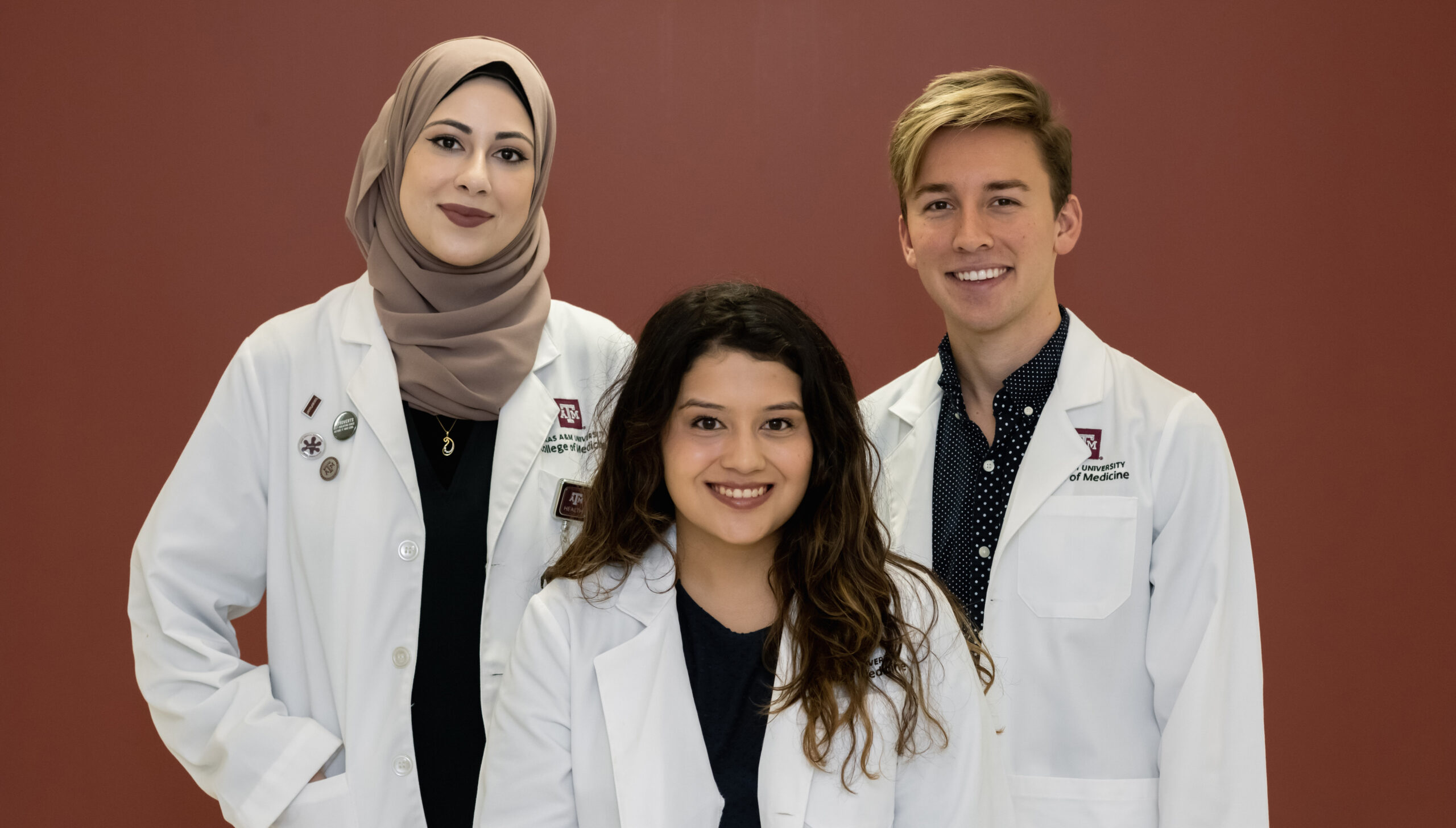Incoming medical students share experiences in Pre-Med Fellows Early Assurance Program

This fall, seven Texas A&M University class of 2021 graduates entered the Texas A&M University College of Medicine through the Pre-Med Fellows (PMF) Early Assurance Program.
The program, created in 2015 as part of a grant with the Texas Higher Education Coordinating Board, is designed for, but not exclusive to, underrepresented students in medicine (Hispanic, African American, Native American) who are interested in pursuing medical school.
“When I found out about the PMF program, I knew it would resonate with me because I am a Muslim woman,” said Doja Qaraqe, a first-year medical student. “It helps minority students put our foot in the door, and it was so amazing to see so many different faces, nationalities, races and religions in this program. We all shared our own experiences of being a minority in the United States, and I think it’s a very special and unique opportunity that the College of Medicine provides for underrepresented students.”
Texas A&M and Prairie View A&M University students are eligible to apply to the program during their sophomore year of their undergraduate studies. Students who are accepted into this program are given guaranteed admission to the College of Medicine and are expected to commit to the College of Medicine for medical school. Up to 15 students are selected every year.
“The PMF program was created to help address the number of underrepresented students in medicine,” said Fernando Vasquez, director of admissions and early assurance programs at the College of Medicine. “Even now, the number of students from these backgrounds in medical school is extremely low. Through this program, we have greatly been able to diversify our incoming cohorts every year, which in turn helps to diversify our future practicing doctors.”
Once admitted, participants are exposed to experiences and opportunities during their undergraduate years that prepare them for a successful entry into medical school, such as mentoring opportunities, attending clinical simulation activities, seminars and student-led programs and enrolling in a MCAT preparation course free of charge.
“Leading up to med school, I’m so thankful that this program provided me with mentorship and support because it made the application and interview process enjoyable instead of the most stressful experience of my life,” said Allan Pulliam, a first-year medical student. “Having experienced the welcoming atmosphere of the College of Medicine beforehand reinforced my belief that the College of Medicine at Texas A&M is absolutely where I belong.”
Jourdan Hydol-Smith, another first-year medical student who participated in the PMF program, was inspired to pursue medicine after seeing a lack of physicians growing up in Jamaica.
“I grew up in Jamaica, so I grew up seeing the negative effects of a lack of resources in rural communities and what that did to peoples’ health,” Hydol-Smith said. “Having those childhood experiences pushed me to pursue this field so that I can make a positive impact on many lives and underserved communities. And throughout my undergraduate years, I fell more in love with medicine as I was able to shadow more and see the effects that doctors are really able to have on their patients.”
Hydol-Smith believes the PMF program can help underrepresented students who may not grow up in affluent areas get a better chance of achieving their dreams of becoming a physician.
“I think a lot of times, people see that there’s a certain race or a certain group that’s underrepresented in medicine, and it’s not because the medical schools don’t want them, it’s because there’s not enough applicants,” Hydol-Smith said. “Programs like this provide a once-in-a-lifetime opportunity for minority students who may not have had the resources or confidence growing up to pursue this field.”
The PMF program helps to increase and diversify the number of practicing physicians that come from underrepresented backgrounds, falling in line with the College of Medicine’s mission to help address the medical needs of all Texans, especially those who are part of medically underserved populations.
“The medical school graduation rate of students who participated in this program is 100 percent (10/10), with another 7 of 7 set to graduate in 2022,” Vasquez said. “Although the program is still young, the data have shown great success in our goals to address the underrepresented number of students who participate in medical education and eventually go on to practice medicine.”
One PMF student, Valeria Gomez, decided to pursue the MD + MBA track that the College of Medicine offers in collaboration with Mays Business School, and will earn her Master of Business Administration (MBA) degree before completing medical school.
“I actually learned about the MD + MBA track through the seminar class I took as a PMF student,” Gomez said. “I felt inspired to go this route because I want to establish and run my own practice, and I found that if I want to be able to create an environment and set the tone to provide quality health care, I need to be knowledgeable in the business or operations aspect of it.”
Gomez felt that the PMF program helped put her on the right track to pursue her dream of filling a health care gap for Spanish-speaking patients.
“For me, I’ve never come across a female doctor who speaks Spanish, and Hispanic women are very underrepresented in the health care industry,” Gomez said. “I want to be an advocate for the Hispanic population, especially those who are female, because I have seen how far people travel just so they can get care from a physician who can communicate in the same language they do. It would’ve been so awesome to be able to have a female Spanish-speaking physician or somebody who looked like me growing up, so I’m very grateful that this program has given me a sense of security in achieving my dream.”
For more information about the requirements of the PMF program and other EAP programs, visit the Texas A&M College of Medicine Early Assurance Programs website.
“This program gives students a sense of confidence and assurance that they belong in this profession,” Vasquez said. “We aim to give them a sense of belonging in a profession that they may have seen traditionally suited for a certain select few in society, so this has allowed students from underrepresented backgrounds to see a path towards their dream and serves as a beacon of hope for them to accomplish those dreams.”
Media contact: media@tamu.edu


